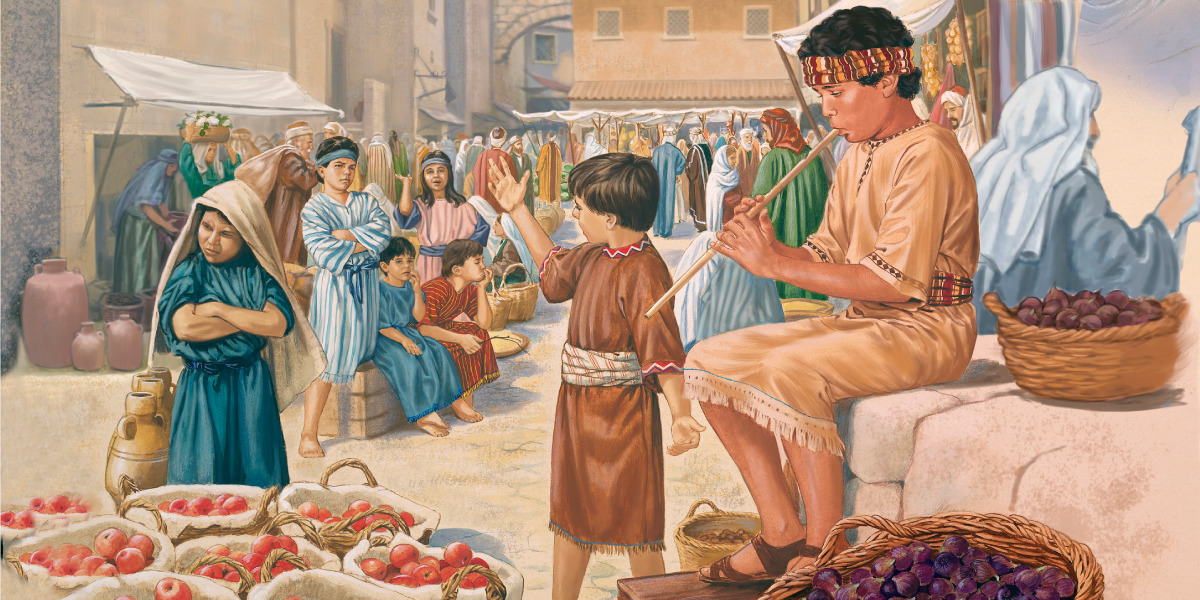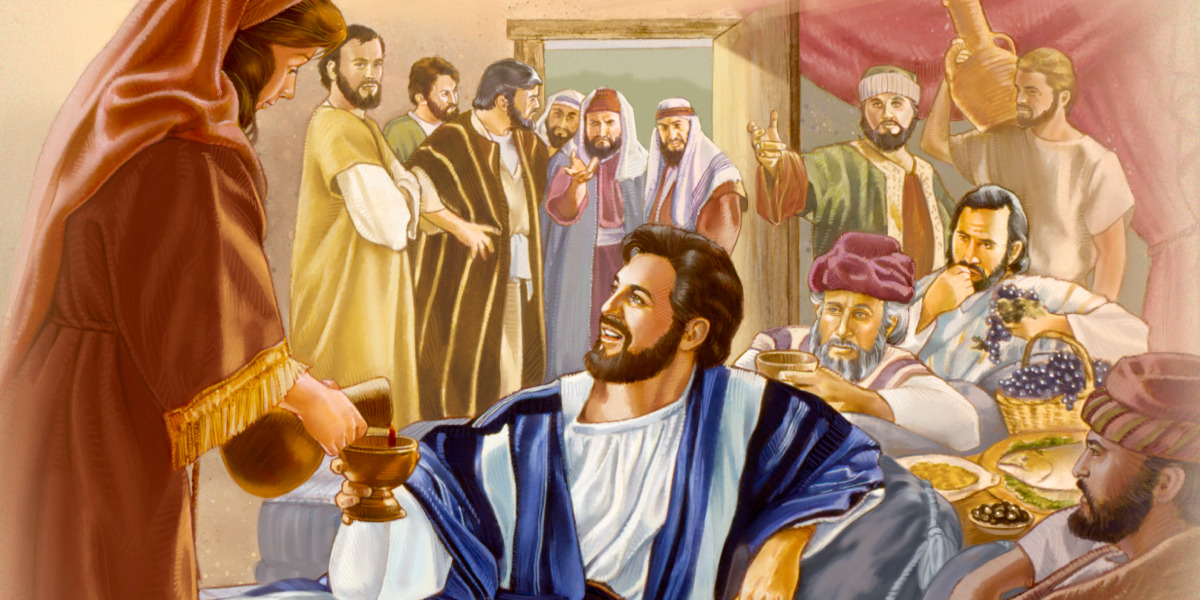Post by The Ambassador on Jun 7, 2019 12:33:07 GMT
Woe to an Unresponsive Generation

Please read MATTHEW 11:16-30 LUKE 7:31-35
Jesus has high regard for John the Baptist, but how do most people regard John? “This generation,” Jesus declares, “is like young children sitting in the marketplaces who call out to their playmates, saying: ‘We played the flute for you, but you did not dance; we wailed, but you did not beat yourselves in grief.’”—Matthew 11:16, 17.
What does Jesus mean? He clarifies the thought: “John came neither eating nor drinking, but people say, ‘He has a demon.’ The Son of man did come eating and drinking, but people say, ‘Look! A man who is a glutton and is given to drinking wine, a friend of tax collectors and sinners.’” (Matthew 11:18, 19) On the one hand, John has lived a simple life as a Nazirite, even abstaining from wine, yet this generation says he is demonized. (Numbers 6:2, 3; Luke 1:15) On the other hand, Jesus lives like other men. He eats and drinks in a balanced way, but he is accused of going to excess. It seems impossible to satisfy the people.
Jesus likens the generation to young children in the marketplaces who refuse to respond by dancing when other children play the flute or by grieving when others wail. “All the same,” he says, “wisdom is proved righteous by its works.” (Matthew 11:16, 19) Yes, the “works”—that is, the evidence produced by John and Jesus—prove that the accusations against them are false.
After Jesus characterizes the generation as unresponsive, he singles out for reproach the cities of Chorazin, Bethsaida, and Capernaum, where he has done powerful works. Jesus says that if he had performed such works in the Phoenician cities of Tyre and Sidon, those cities would have repented. He also mentions Capernaum, which has been his home base for some time. Even there, most did not respond. Jesus says of that city: “It will be more endurable for the land of Sodom on Judgment Day than for you.”—Matthew 11:24.
Jesus then praises his Father, who hides precious spiritual truths “from the wise and intellectual ones” but reveals these things to lowly ones, who are like young children. (Matthew 11:25) He extends an appealing invitation to such ones: “Come to me, all you who are toiling and loaded down, and I will refresh you. Take my yoke upon you and learn from me, for I am mild-tempered and lowly in heart, and you will find refreshment for yourselves. For my yoke is kindly, and my load is light.”—Matthew 11:28-30.
How does Jesus offer refreshment? The religious leaders have burdened the people with enslaving traditions, such as overly restrictive Sabbath regulations. But Jesus refreshes them by teaching the truth of God, free from the taint of those traditions. He also shows the way of relief to ones who feel crushed by the domination of political authorities and to those who feel weighed down by sin. Yes, Jesus reveals to them how their sins can be forgiven and how they can be at peace with God.
All of those accepting Jesus’ kindly yoke can dedicate themselves to God and serve our compassionate, merciful heavenly Father. Doing so does not involve a heavy load, for God’s requirements are not at all burdensome.—1 John 5:3.
Those Whom Jesus Called

For you see your calling, brothers, that there are not many wise according to flesh, nor many powerful, not many wellborn. 27 But God chose the foolish things of the world that the wise might be put to shame, and God chose the weak things of the world so that He might put to shame the strong things. 28 And God chose the low-born of the world, and the despised, and the things that are not, so that He might bring to nothing the things that are, 29 so that no flesh might glory in His presence. (1 Corinthians 1:26—29)
Paul possibly went over the membership of the Corinthian church in his mind as he wrote verse 26. He reminded them that they had very few who were famous, wealthy, highly educated, powerful, or influential when they believed in the Lord Jesus Christ. It is likely that, when they became Christians, they lost a great deal of the prestige, influence, and income they did have. Consider your calling, brethren, he says. Paul always uses the term calling to refer to the saving call of God, the effectual call that results in redemption. “You know what sort of persons you were when God called you out of darkness. You know that He did not accept you as His child because you were brilliant or wealthy or intelligent or powerful. If you were any of these things,” he says, “you were saved in spite of them not because of them. If anything they were stumbling blocks that hindered you, obstacles between you and God’s grace.” He implies that they should be glad that not many were wise according to the flesh or mighty or noble. Such things often keep people from the sense of need that leads to salvation. If more of them had been wise, mighty, or noble, it is likely that fewer of them would have been saved.
God is not looking for Phi Beta Kappas to save and to do His work. Nor is He looking for millionaires or famous athletes or entertainers or statesmen. His salvation is open to them just as surely as to others, but only on the same basis of faith. The very things that put them ahead in the world may actually put them behind with God. It is the feeling of inadequacy that makes people aware that they have need, and often draws them to the gospel.
Jesus prayed on one occasion, “I praise You, Father, Lord of Heaven and of Earth, because You hid these things from the sophisticated and cunning and revealed them to babes.” (Matt. 11:25). As the context makes clear, this prayer was spoken publicly as a part of His preaching to the crowds. He was addressing His hearers as much as His Father when He prayed these words. He wanted them to know that God wanted only their faith and nothing else. He was also warning that “the sophisticated and cunning” were at a disadvantage as far as spiritual life and understanding are concerned. It is not that they could not accept and believe, but that pride in and dependence on their accomplishments and abilities could keep them from the kingdom. Weakness and insufficiency are the climate in which God’s strength is made manifest.
God’s wisdom is a kind of paradox. In human thinking, strength is strength, weakness is weakness, and intelligence is intelligence. But in God’s estimation some of the seemingly strongest things are the weakest, some of the seemingly weakest things are the strongest, and some of the seemingly wisest things are the most foolish. The paradox is not by accident but by God’s design.
A simple, uneducated, untalented, and clumsy believer who has trusted in Jesus Christ as Savior and who faithfully and humbly follows His Lord is immeasurably wiser than the brilliant Ph.D. who scoffs at the gospel. The simple believer knows forgiveness, love, grace, life, hope, God’s Word—God Himself He can see eternity. The unbelieving Ph.D., on the other hand, knows nothing beyond his books, his own mind, and his own experience. He sees nothing beyond this life, and he cannot be considered anything but foolish.
We are often tempted to think that it would be wonderful if such–and–such a great athlete—or brilliant scientist, popular entertainer, or world leader—would become a Christian. But Jesus did not think this way when He chose His disciples. Some were probably well known in their local circles and perhaps a few of them were well off financially. But He did not choose them for their wealth or influence, and in His training of them He did not try to capitalize on any such things. None of them had anything so great that he was not ready to leave it to follow Christ.
Ambassador Publications


 , think of it as a messenger. All members may send instant messages which will be seen by all other members. ~ Admin
, think of it as a messenger. All members may send instant messages which will be seen by all other members. ~ Admin